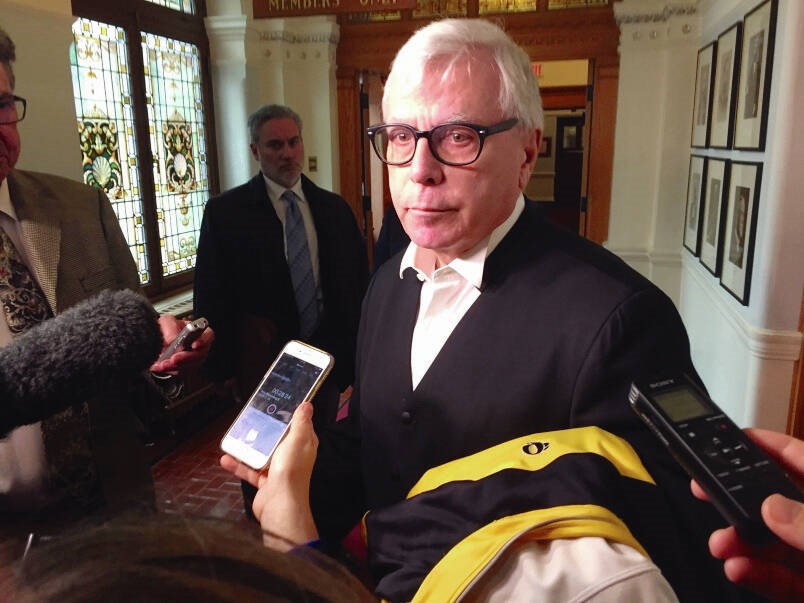The guilty verdict for disgraced former legislature clerk Craig James reinforces a lesson I’ve learned over the years.
Whenever I buy clothes on holiday, I regret it the minute I try them on at home. Because they look stupid.
That hip-looking white shirt that didn’t fit but I bought anyway because Donald Duck was embroidered on the front?
It looked great in Maui. But when I modelled it at home it turned into a fashion crime. What the hell was I thinking?
James may now have a similar case of buyer’s remorse. Except the Brooks Brothers dress shirts from Vancouver and the suit he dinged us for at Ede & Ravenscroft in London turned into real crimes.
And the verdict was delivered by a B.C. Supreme Court justice, not my wife.
He was cleared this week on an assortment of other raps arising from the expenses scandal that former speaker Darryl Plecas detonated in the legislature three years ago.
One of them involved a quarter-million dollar long- service award that James extracted from the old boys club that ran the joint at the time.
It was designed for three previous officials who were mostly on retainers, not full benefit employment contracts. James received substantial employee benefits through his career at the legislature, but worked hard to get that award as well.
Justice Heather Holmes found he was in an obvious conflict of interest and breached the standard of conduct in a serious and marked way by advising the speaker on a matter that was to his benefit.
The justice concluded he likely was not entitled to the award, but may have been led to believe he was by questionable legal advice. So there was no breach of trust.
The 64-page verdict recounts his habit of putting an extraordinary number of purchases on overseas trips on his expense account.
But all the examples fell short of the criminal threshold, she ruled.
Except the clothes. It’s the haberdashery angle that captures the flavour of the whole saga. And it rests on one obvious point. You don’t need a CSI Victoria squad to figure this out.
The clerk wears a gown. Why should we pay for what they wear under the gown, when the job pays more than $300,000 a year — and comes with the gown? So billing the legislature for other clothing and justifying it with fake, spurious reasons stretches the expense account to the snapping point.
He billed the taxpayers $1,887 for those specific buys with memos saying they were for assembly “chamber attire,” and “chamber uniform.”
But the Justice Holmes concluded he did so “dishonestly.”
She found it was a false implication and reinforced a misrepresentation that they were work expenses.
“James’s conduct in actively misrepresenting his purchases, in order to receive reimbursement he knew he was not entitled to, must be seen as a marked departure from the (expected) standard of conduct.”
There were other clothes shopping trips expensed to taxpayers, including a $624 pair of shoes, that look suspect. But the justice said there wasn’t enough evidence on those buys.
He may have thought they were legit.
(“That reason applies also to the suspenders that Mr. James bought and is not undermined by the fact that the suspenders were blue/pink and had a palm tree design, as they would not have been visible under the gown.”)
James’s defence lawyers appear to have recognized that charging the public for what he wore under the gown was going to be a problem. So they argued his claims may have anticipated a modernization of the table officers’ attire to business suits, rather than gowns.
There was evidence that James advocated for such a change. But the justice noted it was firmly rebuffed and there was no evidence that idea was active at the time.
As for the ridiculous legislature wood splitter, which became a national icon for the whole scandal, the argument that it was a crime failed. The splitter wound up in James’ yard for a year, was used lightly, and never made it to the legislature until after he was suspended.
But there was evidence that there was nowhere else to store it, so no criminality was found.
Not to raise a sore point, but for what it represents as a fall from grace, it belongs in a museum.
lleyne@timescolonist.com



